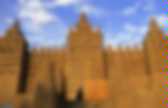

The World Factbook. Location: This entry identifies the country's regional location, neighboring countries, and adjacent bodies of water.
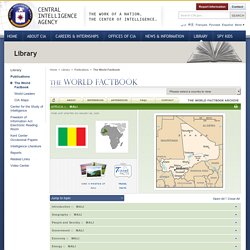
Interior Western Africa, southwest of Algeria, north of Guinea, Cote d'Ivoire, and Burkina Faso, west of Niger Geographic coordinates: This entry includes rounded latitude and longitude figures for the centroid or center point of a country expressed in degrees and minutes; it is based on the locations provided in the Geographic Names Server (GNS), maintained by the National Geospatial-Intelligence Agency on behalf of the US Board on Geographic Names. Map references: This entry includes the name of the Factbook reference map on which a country may be found. Note that boundary representations on these maps are not necessarily authoritative. The entry on Geographic coordinates may be helpful in finding some smaller countries. Area: This entry includes three subfields. This is the population pyramid for Mali. Mali. Skip to main content World Malaria 2014 Access Search Advanced search Navigation Language عربي 中文 English Français Русский Español.
Mischief On Mali—and the Amazigh. Mali is so obscure to the Western world that if you google the name of its president, Amadou Toumani Touré, you only get 202,000 entries, about the same as a mid-level well known American.

The country has been afflicted by a civil war for long stretches of the past few decades, most notably from 1990 to 1996, but no one in the US has much noticed. Coverage of the political situation is particularly lacking. So I have been reading Roger Kaplan’s dispatches from Mali for the Weekly Standard, most notably a feature in the current issue, with great attention.
As a French speaker with long experience in Africa, Kaplan comes with some credentials. And my knowledge of Mali is fragmentary and way out of date—I was first and last there in 1989. Unfortunately, Kaplan’s piece “Mischief in Mali” seems more likely to perpetuate American ignorance of what is going on in this part of the world than to dispel it. Kaplan is surprisingly unsympathetic to the grievances of Mali’s Tuareg people. Libya shockwaves felt in Mali? The Mess in Mali - By Gregory Mann. It would be hard to overstate the mess that's been made out of Mali over the last fortnight.

A surprise coup, an accelerating rebellion that has split the country in two, and an economic embargo by the landlocked country's neighbors have battered what had been, until recently, a West African success story. Add to that a looming food crisis in the northeast, and you have quite a fine mess. But the world can't turn away: Mali is too important to write off the country's 20-year old democracy as a failed experiment.
The coup was not accidental, as some have argued, but it was definitely improvisational. On March 22, a mutiny in the country's main garrison turned into a coup d'état as soldiers and junior officers chased President Amadou Toumani Touré from his palace. Mali’s struggle: not simply of their own making. In examining the political crises which have gripped Mali in recent months, it is important not to fall into simplistic analyses of dysfunctional or “failed” African states.

Indeed, the Malian people have repeatedly demonstrated their ability to mobilize civil society and build stable democratic governance despite a history of enormous poverty, ethnic divisions, and foreign intervention. In 1991, more than two decades prior to similar pro-democracy uprisings in Tunisia and Egypt, Malians engaged in a massive nonviolent resistance campaign that brought down the dictatorship of Mousa Traoré. A broad mobilization of trade unionists, peasants, students, teachers, and others – supported by griots (traditional singing storytellers) who would sing allegorical songs regarding historical freedom struggles – created a mass movement throughout the country. In the years since the 1991 revolution, even contentious politics was expressed largely nonviolently. Mali's Colonel Coup Syndrome. In his first interview after seizing power, Mali's self-proclaimed junta leader, Captain Amadou Haya Sanogo tells a journalist from Africable that he has never cast a vote in his life.
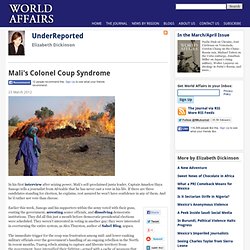
If there are three candidates standing for election, he explains, rest assured he won't have confidence in any of them. And he'd rather not vote than choose. Earlier this week, Sanogo and his supporters within the army voted with their guns, ousting the government, arresting senior officials, and dissolving democratic institutions. They did all this just a month before democratic presidential elections were scheduled.
The Lesson from Mali: Do No Harm - By Christian Caryl. I realize that most Americans or Europeans wouldn't be able to pick out Mali on a map.
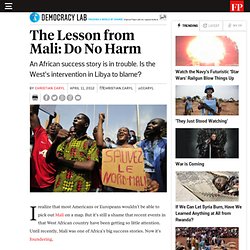
But it's still a shame that recent events in that West African country have been getting so little attention. The Coup in Mali Is Only the Beginning. On March 21, Malian President Amadou Toumani Touré scrambled down the Koulouba hillside into the Bamako neighborhood of Dar es Salaam.
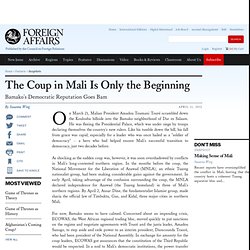
He was fleeing the Presidential Palace, which was under siege by troops declaring themselves the country's new rulers. Trouble in Timbuktu - Ideas. Mali: War Crimes by Northern Rebels. (Bamako) – Separatist Tuareg rebels, Islamist armed groups, and Arab militias who seized control of northern Mali in April 2012 have committed numerous war crimes, including rape, use of child soldiers, and pillaging of hospitals, schools, aid agencies, and government buildings, Human Rights Watch said today.
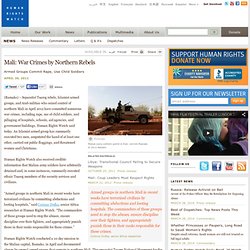
An Islamist armed group has summarily executed two men, amputated the hand of at least one other, carried out public floggings, and threatened women and Christians. Human Rights Watch also received credible information that Malian army soldiers have arbitrarily detained and, in some instances, summarily executed ethnic Tuareg members of the security services and civilians. “Armed groups in northern Mali in recent weeks have terrorized civilians by committing abductions and looting hospitals,” said Corinne Dufka, senior Africa researcher at Human Rights Watch.
These and other armed groups undertook operations in January 2012 when the MNLA launched their bid for a separatist state. Mali: war, Islamism, and intervention.